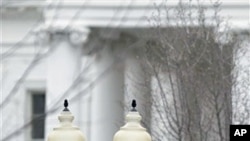A group of U.S. senators has announced a new legislative effort to punish China for its currency policies on the eve of a state visit to Washington by Chinese President Hu Jintao.
Democratic U.S. Senators Bob Casey, Charles Schumer and Debbie Stabenow said Monday they will introduce legislation to address what they call currency "misalignments" that "unfairly" harm U.S. trade.
Under the bill, countries designated as currency manipulators by the U.S. Treasury Department will face tariffs on their exports. Companies from such nations also would be banned from receiving U.S. government contracts.
Schumer says the legislation is a message to Mr. Hu, who arrives in Washington on Tuesday ahead of talks with U.S. President Barack Obama.
U.S. lawmakers and the Obama administration accuse Beijing of keeping the yuan artificially weak, making Chinese exports relatively cheap and driving up China's trade surplus with the United States. They want Beijing to allow the yuan to strengthen more quickly to reduce that imbalance.
It is not clear if the legislation will have enough support to be adopted by both branches of the U.S. Congress. Similar measures have fallen short in recent years.
In another development, China's official Xinhua news agency says a Chinese delegation visiting the southern U.S. state of Texas has signed deals with U.S. businesses worth $600 million. Chinese Vice Commerce Minister Wang Chao is leading the delegation, which was in the city of Houston Monday.
Chinese President Hu gave no sign of a shift on the currency dispute in an interview with two U.S. newspapers published Sunday. Responding to written questions from The Washington Post and Wall Street Journal, Mr. Hu said the dollar's dominance of the global currency system is a "product of the past."
But, he also called on the United States to keep the world's supply of dollars "reasonable and stable." China is the world's biggest foreign holder of U.S. government debt.
Mr. Hu said China and the United States should seek "common ground" on a wide range of issues and "abandon the zero-sum Cold War mentality," in which one country's gain is another country's loss. He said both countries stand to gain from a sound relationship "and lose from confrontation."
Xinhua adopted a similar tone in an article Monday, saying Mr. Hu's visit is aimed at "further enhancing the strategic mutual trust" between the countries. It said improvements in mutual trust will "contribute to the stability of Asia and the entire world."
Mr. Hu did not directly address questions submitted by the newspapers about human rights, including queries about jailed Chinese dissident Liu Xiaobo, the winner of last year's Nobel Peace Prize. In an apparent reference to such criticism, Mr. Hu both nations must "respect each other's choice of development path."
Some information for this report was provided by AP, AFP and Reuters.




